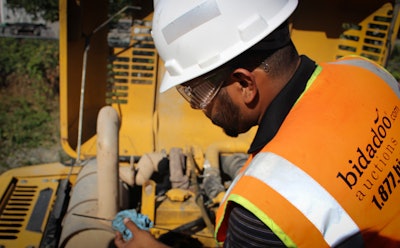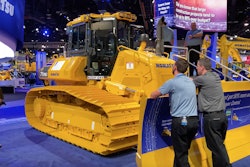 Ritchie Bros. says it has seen a 45 percent-plus year-over-year increase in visits in March across both its IronPlanet and Ritchie Bros. websites.
Ritchie Bros. says it has seen a 45 percent-plus year-over-year increase in visits in March across both its IronPlanet and Ritchie Bros. websites.As heavy equipment auction companies move to online-only operations in COVID-19 coronavirus conditions, they are seeing significant interest in what’s for sale.
“We are seeing record attendance for almost every auction we are conducting right now,” says Kari Taylor, president of Ritchie Bros. U.S. Regions, which she attributes to Ritchie’s marketing thrust of online advertisements, emails, news releases and calling customers to explain the company’s switch to online-only. “We’re in the auction business and people are looking for a deal,” she says.
The current environment is only underlining the advantages of online bidding, says Howard Hawk, president, Bidadoo, which sells on eBay.
“It doesn’t make any sense to send equipment to a live auction site if you’re just going to list it online anyway,” Hawk says. Bidadoo says it has 60,000 visitors a week and that traffic was up 42 percent during its last three weekly auctions in March when the coronavirus impact was starting to take hold.
One thing Ritchie says is helping in its move to online-only is the fact the technology has been in place for several years. Before the virus, 60 to 70 percent of its bidders were online, competing with those in a live auction. “It was a fairly easy pivot for us,” says Kevin Kobus, vice president, U.S. live auction operations for Ritchie. “We’re just not having the live auction portion right now.”
“The demand for online auctions is accelerating,” Hawk says. “We’ve seen some of the biggest packages and consigned items just over the past week. The reality is hitting that this is going to have a long tail to it in terms of equipment utilization, and so people are accelerating their selling.” (Note: Equipment World talked to Hawk the week of April 6th.)
“There’s going to be a surge of selling,” says Chris Deason, U.S. business development manager with Yoder & Frey, a division of Euro Auctions.
And customers seem to be quickly adjusting to technology, Deason says. “I’ve had some older construction customers who I would never have imagined would be calling me on FaceTime,” he says. “Although there are customers who prefer to buy in person, that number dramatically decreases every year. I think this has fast forwarded the switch to online.”
 Auction equipment inspections are typically solitary affairs, safely done at a distance from others on a site.
Auction equipment inspections are typically solitary affairs, safely done at a distance from others on a site.
Factors in play before coronavirus
Some factors affecting today’s auctions were well in play before the coronavirus impact hit. Hawk says 2020 was already shaping up to be a big auction year simply because of equipment cycles and the impact of the last downturn.
Hawk says the start of the last decade — still reeling from the Great Recession — saw lower new equipment volumes coming out of manufacturing plants, followed by a large buying cycle in 2011-2013. If the market follows a typical 7-to-8-year cycle, now is when the industry is selling.
“Utilization was also flattening out, so many were getting to point where their equipment fleet was aging and they needed to sell,” Hawk says. “There was already going to be a lot of used equipment in the marketplace but now we’re seeing that accelerate.”
Another item in play prior to the virus outbreak is that 2020 is an election year, which Deason says always has an impact on auctions. “In every presidential election year as long as I’ve been in the business, people get reluctant to pull trigger on jobs, which slows spending just because of the concern of who is going to be in office and whether or not they are going to be pro construction. I think it’s more significant, really, than the virus because we know there will be an end to the virus.”
Pricing
“While prices have definitely gone down a bit – 5 to 15 percent depending on the category – they haven’t fallen off the cliff,” Hawk says. “The demand is staying pretty strong. We’ve hit some numbers in the past couple of weeks that were just as good, if not better, than what we were hitting three to six months ago.”
No surprise, but older machines with 4,000-plus hours, are seeing lower prices, Hawk says. “That’s a combination of the plethora of older equipment in the marketplace, export markets and foreign exchange rates,” he explains. “About a third of everything we sell goes to other countries and international exports are currently down, but we expect them to come back as countries recover from the coronavirus.”
Deason adds: “As we saw in February in Orlando this year, the older equipment is declining and probably will continue to decline because of the sheer volume of machines we’re seeing at the market. Dealers held on the inventories longer when new deliveries from the OEMs had slowed earlier. All that inventory that they normally would have pushed out at around 4,000 hours they let go at 7,000 hours.”
On the other hand, lower-hour equipment is retaining its value. “Because of the higher volume of the high-hour machines, it’s actually pushed up the value of the lower hour, under 3,000-hour machines,” Hawk says
“As of mid-April, low-hour and low-mileage assets continue to command strong prices,” Taylor says. “However, there are a lot of unknowns at this point that may impact pricing, such as when and how people return to work—especially with unemployment at record levels. This will certainly have impact on project commitments and sector-specific economic conditions, which, in turn, will impact pricing.”
And when virus impacts start to lessen, there are several indications that demand will be heightened, especially if infrastructure spending sees an anticipated upswing. “I think people are speculating on that demand, too,” Hawk says.
Sellers who are able to time the market are naturally asking whether this is a right time to sell, Deason says. “I don’t think anyone has an answer to that, but as with most cases there’s really no better time than the present because we do anticipate a surge in selling. Not everyone will come out unscathed and there will be a large influx of equipment.”
“We’re seeing some decent pricing so if you were going to sell it anyway, I don’t think equipment prices will be better than they are now,” Hawk says.
Financing, logistics
On the lending front, incoming application inquiries are “extremely strong,” says Jim Case, CEO, Ritchie Bros. Financial Services, “and approval rates have stayed in line with before.” Because of this, Ritchie has not changed its credit policies, although Case notes a number of customers have asked about refinancing.
Hawk reports bidadoo has seen an increase in financing requests. “I think it’s too early to tell how that will translate into closings and actual financing,” he says. Bidadoo forwards financing requests to its financial partners.
Social distancing has prompted some auction logistical changes. Because Ritchie limits the number of people who can enter a facility, buyers now have up to 30 days instead of the usual 14 days to move machines from a lot, Kobus says.
Although transportation is considered an essential business, trucking firms have to run the gauntlet of ever-changing state and local restrictions, not to mention buyer and seller preferences and realities. “Some companies don’t want truckers coming into their branches to pick up equipment and some businesses have just shut down,” Hawk says.
Lessons learned from the Great Recession?
Auctions serve as the steam-release valve on the equipment market, and it’s likely there will be more business distress, particularly from the oil and gas market, which was going under pricing pressures separate from the virus impact.
Hawk is anticipating increased forced liquidations three to six months out, as is Deason. “Where the virus will have the biggest impact is putting a lot of companies in a financial bind, particularly in the oil and gas sector,” Hawk says.
Are there correlations and lessons to be learned from the Great Recession?
“We see that people have been much smarter in leveraging this time around,” Kobus says. “There were more forced liquidations then, and people who needed to make payroll. We want to help our customers maintain normalcy; they still need to do business. A lot of them have a wait and see attitude; this is not like an economic downturn cycle. This is different.”
And what happens if the economic flood gates open all at once? “Inventory will be our main concern, and how to get machines to our customers,” Kobus says.
“Prior to this, our economy was rocking along pretty well, especially in construction,” Deason says. If there’s a sharp ramp up, he says, it will soften the curve of the machine influx and make values go up.
Deason points out, though, that he’s is still out in the field doing equipment inspections, something easily accomplished at a distance. “Everywhere I go, construction jobs are up and running, even residential jobs,” he says. “Our people have continued to work through this, and that’s the big difference maker.”











